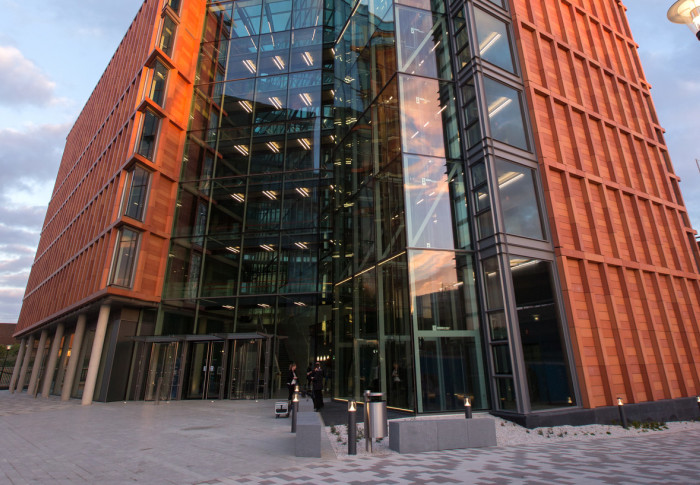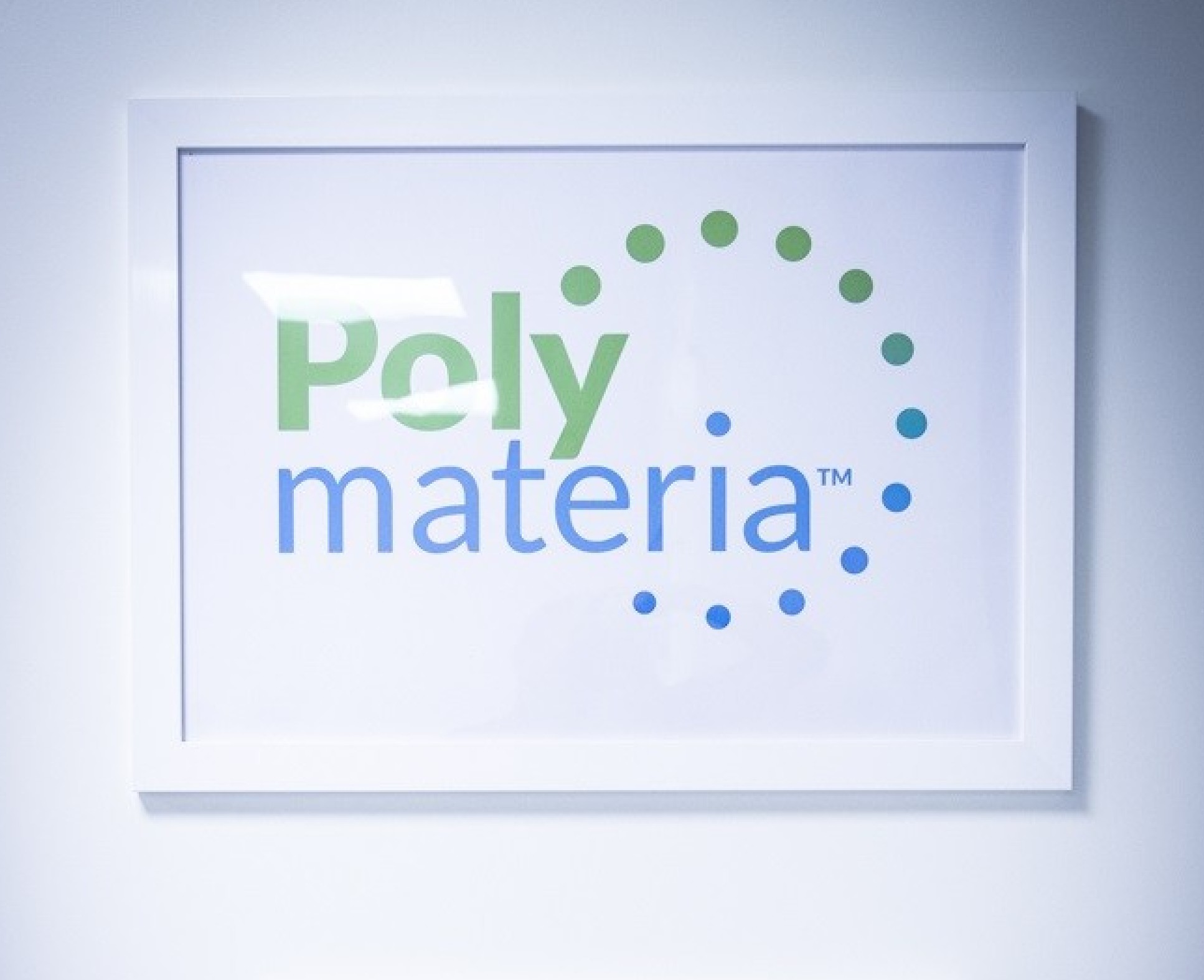Moving on up: Imperial Incubator companies continue their journey at White City

The I-HUB building provides space for deep science companies
Two of the Imperial White City Incubator’s graduates have now taken their own space within Imperial’s I-HUB building as they grow and develop.
Life sciences company Pulmocide and environmental tech business Polymateria took space in Imperial’s startup incubator in White City during its first years of activity. Now these two science-driven enterprises have transferred up into the second floor of the Translation & Innovation Hub (I-HUB), joining a range of deep tech companies and remaining part of the White City and Imperial entrepreneurial ecosystem.
Scaling internationally

Polymateria is tackling the global problem of plastic pollution from a redesign perspective, bringing together expertise in chemistry, biology, polymer science and environmental sciences to develop a new standard of biodegradable and compostable plastics.
Because its work is so deeply rooted in science, it is important for the company to be close to research expertise and facilities. Polymateria moved into the Incubator in 2017 to benefit from the potential offered by the White City Campus and become part of the network of academics, scientists, companies and CEOs that was developing in the area. Since this time, the White City Campus has been transformed, and Polymateria has strengthened its connections with Imperial researchers and the wider scientific and commercial community, particularly through the establishment of Imperial’s Molecular Science Research Hub.
“The Incubator is unique because it brings together such a diversity of companies,” said Dr Chris Wallis, Vice President of Innovations at Polymateria. “The team there run events on subjects that are important to a company’s development, whilst the shared spaces allow residents to meet and exchange experiences with fellow companies. I think this access to people, information and networks all helps in the transition of relatively young startups to professional businesses. Since we’ve been at White City we’ve found the Incubator and the I-HUB are very receptive to feedback, which is important in these times when both companies and the innovation spaces they inhabit need to be so responsive to change.”
With Polymateria requiring a larger space for people and equipment, the company decided to move within the I-HUB earlier this year. They are now looking to increase their global reach and believe a base at White City provides plenty of opportunity to connect further with international markets and establish global partnerships. This is not only because of its London location, but because of the reputation the White City Campus has gained as a hub for science-based innovation.
Commenting on Polymateria’s move from the Incubator to the I-HUB, CEO Niall Dunne said: “One of the many benefits we have found in working within such a prestigious institutional setting is that it has supported our global expansion, facilitating Polymateria to expand its team in hiring exceptionally-talented scientists from all around the world. Such world class facilities, as are provided at the I-HUB, have no doubt helped us to attract some of the best scientists who have joined our mission to tackle global plastic pollution at scale through a rigorous deep tech approach.”
Translational medicine
Pulmocide is a biopharmaceutical company developing a new range of inhaled medicines for life-threatening and difficult-to-treat lung infections that pose significant global health problems. Their innovative approach aims to provide targeted delivery to the site of the infection, resulting in more effective treatment and minimal side effects.
The company moved into the Imperial White City Incubator from Imperial’s former South Kensington incubator in early 2017, and it was in the brand-new lab space there that the team worked on the discovery and development of their novel inhaled medicines to treat lung infections.
“I believe the Imperial White City Incubator is the best in London,” says Dr Kaz Ito, Director of Biology at Pulmocide. “It has a fabulous team who have always been helpful, kind, trustworthy and efficient and our laboratory team enjoy being surrounded by startups working on so many different projects in research and technology.”
With the founder and other members of the Pulmocide team holding positions at the National Heart and Lung Institute at Imperial and as a company physically located on College grounds, the team have drawn on the medical expertise, clinical materials and facilities at the College in their drug-discovery stage.
In last couple of years, they have run their Phase 1 clinical trials to establish the safety of two new drugs: PC945, a clinical candidate for fungus Aspergillus infection and PC786, a clinical candidate for respiratory syncytial virus (RSV) infection. They have already treated patients with PC945 and by tapping into Imperial’s proficiency for translational medicine and clinical trials their plan is to expand their clinical trial activities over the next couple of years.
“Now we are in the clinical stage of development, the I-HUB is a very convenient location to receive and analyse samples from London and Greater London,” says Dr Ito. “Imperial has an excellent track record in clinical trials and we are working with the Royal Brompton & Harefield NHS Foundation Trust who specialise in respiratory problems and is a partner of the Imperial College Academic Health Science Centre. For us it makes complete sense to stay at White City and move to the I-HUB where we can progress with our clinical trial work whilst also continuing with basic science and development.”
Familiar faces and similar ground
Another past-resident of the Imperial White City Incubator, Mina Therapeutics, has also recently moved to level 2 of the I-HUB. An advanced therapies company that uses gene activation to develop medicines that restore functions to cells, Mina Therapeutics moved to I-HUB level 1 in March 2019 before transitioning to level 2 in June 2020. Again, along with Pulmocide and Polymateria, they were one of the first companies to move into the Incubator in 2017.
Mina Therapeutics will join two other advanced therapies companies who have also recently made the move into the I-HUB. LIfT Biosciences is developing an advanced therapies medicinal product to treat solid tumours by extracting stem cells from volunteers with exceptional innate immune systems. Quell Therapeutics is developing technology to genetically enhance a type of T cell that dampens down the immune response with the ultimate aim of treating patients with autoimmune and inflammatory disease.
Together with additional new I-HUB residents Datar Cancer Genetics UK Ltd and Micrographia Bio Ltd these companies demonstrate the depth of science-based innovation that continues to base itself at White City.
Head of Incubation at the Imperial White City Incubator, Graham Hewson, said: “Seeing these companies develop and grow over time within our Incubator and its community provides a striking example of the business benefits that co-locating a young startup with a world-leading University, corporates and other businesses with a shared focus can bring.
“We wish Polymateria and Pulmocide the best of luck and are excited to see what the future holds for them and we hope to continue to work with them."
Article text (excluding photos or graphics) © Imperial College London.
Photos and graphics subject to third party copyright used with permission or © Imperial College London.
Reporter
Franca Davenport
Communications and Public Affairs